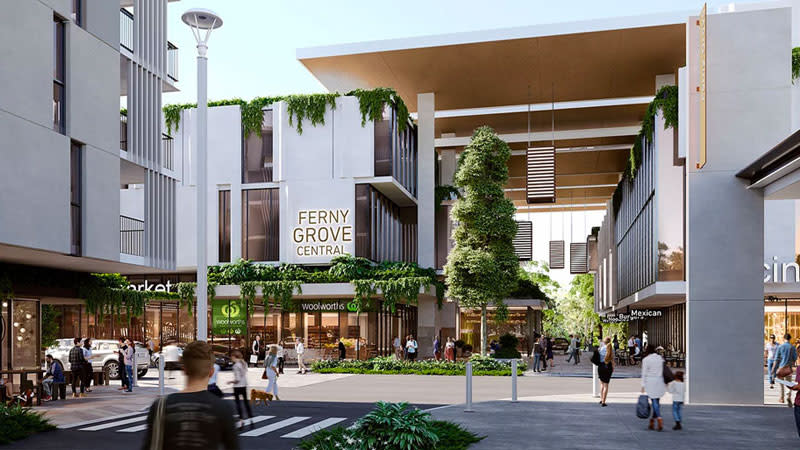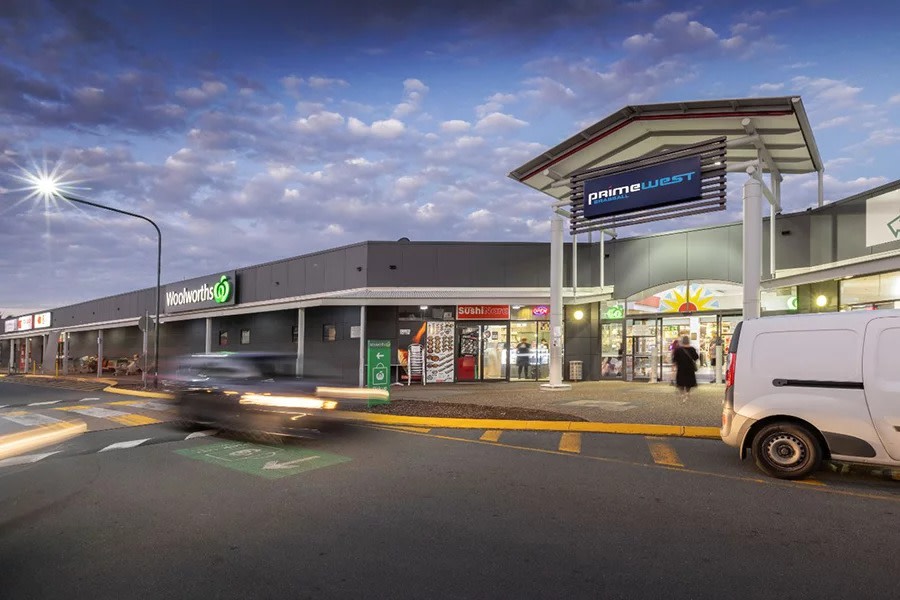Resources
Newsletter
Stay up to date and with the latest news, projects, deals and features.
Subscribe
Queensland developer Honeycombes Property Group is looking to cash in the retail elements of its $140-million mixed-use development in Brisbane’s north-western suburbs.
Honeycombes, in partnership with Melbourne-based real estate financier MaxCap, broke ground on Ferny Grove Central—a 12,000sq m neighbourhood village and a 1400-space multi-level parking facility for commuters—at Ferny Grove train station in mid-2021.
The transit-oriented development, which is being constructed by Broad Construction, a Perth-based subsidiary of CPB Contractors and part of CIMIC Group.
It is due to be completed in late 2023 and will also feature a 82-apartment residential building known as The Fernery.
Honeycombes, led by Peter and Vanessa Honeycombe, secured the development rights to the site in 2017 after a competitive tender process run by the Queensland government.
The broader project, known as Ferny Grove Village, follows on from the company’s $250-million, 366-apartment redevelopment of Coorparoo Square in the city’s eastern fringe, delivered over three stages in partnership with Frasers Property Australia.
The developer has now enlisted JLL’s Jacob Swan and Sam Hatcher to sell the project’s shopping centre, or convenience retail and essential services components, dubbed Ferny Grove Central.

Major retailers have already snapped up spots in the precinct including a full-line Woolworths supermarket, Dan Murphy’s, Goodstart Childcare, Goodlife Fitness Centre and Cinebar as well as a medical and allied health precinct, essential services and food and beverage operators.
Swan said the development, once realised, would offer an extensive 12.2-year WALE, favourable net lease structures, strong fixed annual reviews and significant future growth potential and income security.
“From an investment perspective, there is nothing that compares to the scale, security and quality that [this development] presents,” Swan said.
“The strong focus on non-discretionary and essential service retailers will cement the centre as the ‘go to’ convenience asset in one of Brisbane’s highest growth catchments.”
Peter Honeycomb said Honeycombe had drawn “a high level of unprecedented interest” from the local market, highlighting the level of demand for both residential apartments and retail opportunities.
“With a range of prominent national retail and entertainment offerings in addition to the sophisticated residences, [the development] is set to reignite Ferny Grove and surrounding suburbs,” Honeycomb said.
Honeycombes will be buoyed by the rapid rebound in sales in recent months as shoppers shrugged off omicron caution to push spending almost 20 per cent higher than pre-pandemic levels.
Smaller, more defensive neighbourhood shopping malls have in turn been the top pick for retail real estate investors during the disruption caused by Covid with transactions in that category hitting a record $2.7 billion through 2021.
As the trends of working from home and home renovation accelerated through the pandemic, investor demand for large-format retail centres also ramped up.
The result marked a record year for the sub-sector by a significant margin, and a substantial increase from the $1.5 billion recorded in 2020.
Among recent transaction underlining this was the sale of a half stake in Westfield Helensvale shopping centre to fund manager IP Generation for $185 million.

Meanwhile, Perth-based Primewest, now a Centuria Capital Group subsidiary, has listed four neighbourhood shopping centres and Tyne Square, in the Perth CBD, on behalf of a matured fund.
The $200-million portfolio comprises the Brassall Shopping Centre in Ipswich, Port Village in Port Douglas, both in Queensland; Primewest Dernancourt and Fairview Green in Adelaide: and Tyne Square in Perth.
JLL has again been enlisted to market the portfolio on behalf of a number of unlisted Primewest funds that have reached their maturity.
“We have seen a shift in investor demand looking to increase weighting to the sector, however, this remains difficult in what is a highly fragmented sector,” Hatcher said.
“Population growth is a key long-term driver of food retailing which underpins convenience retail assets.
“While border closures weighed on population growth in the short term, Australia is forecast to have one of the strongest rates of population growth among developed countries over the next five years.”